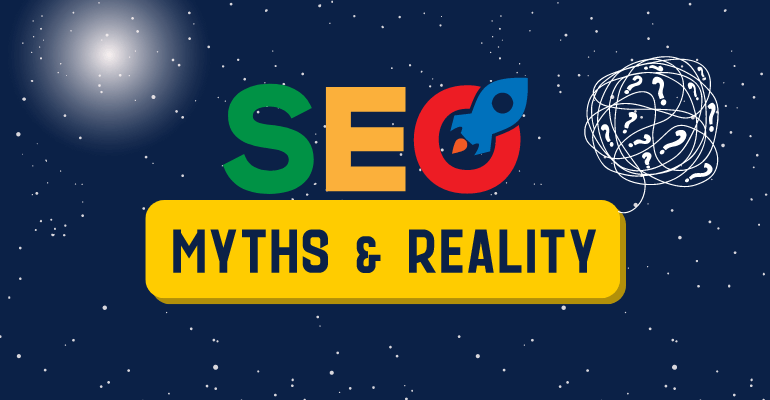Why Understanding SEO Myths Matters
In the digital age, Search Engine Optimization (SEO) is a crucial tool for anyone looking to improve their website’s visibility. However, for beginners, navigating the world of SEO can be confusing, especially with so many myths and misconceptions floating around. These myths often lead to misguided strategies, wasted resources, and missed opportunities.
Understanding the difference between SEO myths and reality is essential. By debunking these myths, you can approach SEO with the right mindset, focusing on proven strategies that will actually benefit your website. Whether you’re running a small blog or managing a business website, knowing the truth about SEO will empower you to make smarter decisions and see real results.
Myth: SEO is Just About Using Secret Tricks
SEO often gets portrayed as a mysterious practice, shrouded in secrecy and reliant on a few insider tricks that only experts know. This myth leads many beginners to believe that they need to uncover some hidden formula to rank their websites on Google. However, the reality is quite different.
The Truth: SEO is a Strategic Process
SEO is not about secret tricks; it’s about understanding and implementing a well-rounded strategy that aligns with search engine guidelines. It involves optimizing your website’s content, structure, and technical aspects to make it more accessible and valuable to users and search engines alike.
The foundation of effective SEO includes:
- Keyword Research: Identifying the terms and phrases your audience is searching for.
- On-Page Optimization: Ensuring that your content, meta tags, and URLs are optimized for those keywords.
- Content Quality: Creating valuable, relevant content that answers your audience’s questions and meets their needs.
- Technical SEO: Improving site speed and mobile-friendliness and ensuring proper indexing by search engines.
- Link Building: Acquiring high-quality backlinks from reputable websites to enhance your site’s authority.
These are not quick fixes or tricks; they are part of a comprehensive strategy designed to improve your website’s visibility over time. Success in SEO comes from consistently applying these practices, analyzing the results, and making adjustments as needed.
In essence, there’s no magic involved in SEO—just a commitment to following best practices and continuously improving your site to meet your audience’s needs and the standards set by search engines.
Myth: All SEO Practices Are Spammy and Unethical
Many beginners hesitate to dive into SEO because they believe it’s inherently shady or unethical. This myth often stems from the association of SEO with spammy tactics like keyword stuffing, link farming, or tricking search engines with low-quality content. While some unethical practices do exist, they represent a small, outdated fraction of what SEO truly involves today.
The Truth: Ethical SEO Builds Your Reputation
Ethical SEO, often called “white hat” SEO, is legitimate and essential for building a reputable online presence. Rather than trying to game the system, ethical SEO focuses on creating genuine value for users and aligning with the guidelines set by search engines like Google.
Here’s what ethical SEO looks like:
- High-Quality Content: Ethical SEO prioritizes content that is informative, well-researched, and genuinely helpful to your audience. It’s about answering questions, solving problems, and providing value.
- User Experience: Google and other search engines reward websites that offer a positive user experience. This means ensuring your site is easy to navigate, loads quickly and is accessible on all devices.
- Natural Link Building: Rather than buying or trading links, ethical SEO involves earning backlinks by creating content that other reputable sites want to link to. These links are genuine endorsements of your content’s quality.
- Transparency: Ethical SEO practitioners are transparent with their clients and users. They don’t promise overnight results but focus on sustainable, long-term growth.
By embracing ethical SEO, you’re not just boosting your site’s rankings—you’re also building trust with your audience. This trust translates into higher engagement, more referrals, and, ultimately, a stronger online reputation.
Myth: Ethical SEO is a Waste of Time and Money
It’s easy for beginners to get discouraged when they don’t see immediate results from their SEO efforts. This often leads to the belief that ethical SEO—where you follow best practices and avoid shortcuts—is a waste of time and money. Some may feel tempted to abandon SEO altogether or turn to quick, unethical tactics that promise instant success. However, the reality is far different.
The Truth: Long-Term Success Comes from Doing It Right
Ethical SEO is not about quick wins; it’s about building a solid foundation for sustainable growth. While it may take time to see significant results, the investment in ethical SEO is well worth it. Here’s why:
- Sustainable Rankings: Quick fixes might give you a temporary boost in rankings, but penalties from search engines often follow them. Ethical SEO, on the other hand, ensures that your rankings are earned through quality and relevance, making them more likely to endure.
- Increased Organic Traffic: By focusing on creating valuable content and optimizing it properly, you attract visitors who are genuinely interested in what you offer. Over time, this leads to increased organic traffic, which is more sustainable and cost-effective than paid advertising.
- Better User Engagement: Ethical SEO practices improve user experience, leading to higher engagement rates. When users find your site easy to navigate and your content helpful, they’re more likely to stay longer, explore more pages, and even convert into customers.
- Building Trust and Authority: When your site consistently provides valuable content and adheres to SEO best practices, it builds trust with both users and search engines. This trust translates into better rankings and more opportunities for your site to appear in featured snippets, voice search results, and other prominent positions.
- Cost-Effectiveness: While ethical SEO may require an initial investment of time and resources, it’s more cost-effective in the long run compared to constantly paying for ads or trying to recover from penalties associated with unethical practices.
Ethical SEO is a long-term strategy that pays off with lasting results. It’s about playing the long game, building your site’s authority, and ensuring that your success is sustainable and beneficial to your audience.
Myth: You Need to Be a Tech Expert to Do SEO
One of the most intimidating aspects of SEO for beginners is the belief that it requires a deep technical background or advanced coding skills. This myth can deter many people from even attempting SEO, under the assumption that they need to be web developers or IT experts to succeed. However, this couldn’t be further from the truth.
The Truth: SEO is Accessible to Everyone
While there are technical components to SEO, you don’t need to be a tech expert to get started. Many of the most effective SEO practices can be learned and applied with basic knowledge and the right tools. Here’s how SEO is made accessible:
- User-Friendly Tools: Numerous SEO tools designed specifically for beginners simplify the process. Platforms like Yoast SEO, SEMrush, and Google Search Console offer intuitive interfaces and guides to help you optimize your site without writing a single line of code.
- Content is Key: A large part of SEO is about content creation. This involves writing articles, creating videos, and producing other types of content that answer your audience’s questions. If you can create content that resonates with your audience, you’re already doing a significant part of SEO.
- Learning Resources: The internet is full of free resources and tutorials that can help you understand SEO. Websites like Moz, Ahrefs, and Google’s own SEO Starter Guide offer step-by-step instructions that are easy to follow, even for beginners.
- Community Support: SEO has a large and supportive community where beginners can ask questions, share experiences, and learn from others. Forums, social media groups, and SEO communities on platforms like Reddit or LinkedIn are great places to seek advice and grow your knowledge.
- Basic Technical Knowledge: While some technical knowledge can enhance your SEO efforts, most beginners can achieve a lot by focusing on non-technical aspects. Basic technical SEO, like ensuring your site is mobile-friendly or improving page load speed, can often be managed with the help of plugins or simple tweaks to your site’s settings.
- Focus on Best Practices: Adhering to SEO best practices—like optimizing meta tags, using descriptive URLs, and ensuring your site is easy to navigate—can significantly improve your site’s performance without needing advanced technical skills.
In summary, you don’t need to be a tech wizard to do SEO. With the right resources, tools, and a willingness to learn, anyone can master the basics of SEO and start seeing results. The key is to start simple, focus on what you can manage, and gradually build your skills over time.
Myth: SEO Only Benefits Big Businesses
A common misconception is that SEO is primarily beneficial for large corporations or e-commerce giants with massive budgets and resources. Many small business owners and individuals with personal websites believe that SEO is out of their reach or unnecessary for their needs. This myth can lead to smaller sites neglecting SEO entirely, missing out on valuable opportunities to grow their online presence.
The Truth: SEO is for Websites of All Sizes
SEO is not exclusive to big businesses; it’s a vital tool for websites of all sizes. In fact, small businesses and personal websites can often benefit even more from targeted SEO strategies. Here’s why SEO is essential for everyone:
- Leveling the Playing Field: SEO allows small businesses to compete with larger companies by targeting specific, local, or niche markets. By focusing on long-tail keywords and local SEO, smaller websites can attract highly relevant traffic that larger companies might overlook.
- Cost-Effective Marketing: Small businesses often have tight budgets. SEO offers a cost-effective way to market your products or services compared to traditional advertising or expensive PPC campaigns. A well-optimized website can continuously attract organic traffic without the ongoing costs associated with paid ads.
- Local SEO: Local SEO is incredibly powerful for businesses serving specific geographic areas. Optimizing for local search terms, setting up a Google My Business profile, and encouraging customer reviews can help small businesses become more visible in their local communities.
- Niche Authority: Smaller websites can focus on specific niches and become authorities in those areas. By producing high-quality, specialized content, they can build a loyal audience and achieve strong rankings for niche keywords that larger, more general sites might not target.
- Building Trust with Your Audience: Just like big brands, smaller websites can build trust and credibility through effective SEO. By providing valuable content and a great user experience, small businesses can establish themselves as trusted sources in their industries.
- Sustainable Growth: SEO provides a foundation for long-term growth. While it might take time to see results, SEO’s benefits accumulate over time, leading to sustained increases in traffic and visibility, which can be especially valuable for small businesses looking to expand.
- Personal Connection: Small businesses and personal websites often have the advantage of creating more personal connections with their audience. SEO can help amplify this by ensuring your content reaches the people who are most interested in what you have to offer.
In essence, SEO is not just for big players; it’s a powerful tool for any website looking to improve its visibility, attract more visitors, and grow its business or audience. By implementing effective SEO strategies, small businesses, and personal sites can carve out their own space in the competitive online landscape.
Myth: SEO Means Paying for a Full Website Overhaul
A prevalent myth is that optimizing your website for SEO requires a complete redesign, a new content management system (CMS), or expensive web hosting upgrades. This belief can be particularly daunting for small business owners or individuals with limited budgets, leading them to think that SEO is financially out of reach. However, this assumption is far from accurate.
The Truth: SEO Can Work with What You Already Have
In most cases, you don’t need to completely overhaul your website to achieve effective SEO results. While certain situations may call for updates or improvements, many SEO strategies can be implemented on your existing site without significant expense or disruption. Here’s how SEO can be integrated into your current setup:
- On-Page Optimization: One of the most effective SEO practices involves optimizing the content and structure of your existing pages. This includes updating meta titles, descriptions, and headers and ensuring that your content is relevant and keyword-optimized. These changes can be made easily within your current CMS.
- Content Updates: Instead of creating entirely new content, you can optimize what you already have. This might involve updating older blog posts with new information, adding relevant keywords, or improving readability. These tweaks can make a big difference without requiring a redesign.
- Technical SEO Adjustments: Most technical SEO improvements, such as optimizing images for faster loading times, fixing broken links, or ensuring mobile-friendliness, can be made without overhauling your site. Tools like Google Search Console and various plugins can help identify and fix technical issues with minimal cost.
- Site Speed Enhancements: Improving site speed is crucial for SEO, but it doesn’t necessarily require new hosting or a complete redesign. Simple changes, like compressing images, using a caching plugin, or minifying CSS and JavaScript files, can significantly boost your site’s performance.
- Using SEO-Friendly Plugins: If your website is built on platforms like WordPress, you can take advantage of SEO-friendly plugins like Yoast SEO or All in One SEO Pack. These tools guide you through the process of optimizing your site without needing to change your CMS or hire a developer.
- Structured Data and Schema Markup: Implementing structured data can help search engines understand your content better. While this might sound complex, there are user-friendly tools and plugins that allow you to add schema markup to your existing pages without a complete overhaul.
- Focus on User Experience (UX): SEO and user experience go hand in hand. Simple changes, like improving navigation, making buttons more accessible, or ensuring content is easy to read, can enhance both your SEO and UX without requiring a redesign.
In summary, while some websites might benefit from a redesign for SEO reasons, most sites can achieve significant improvements by working within their existing framework. By focusing on content, on-page optimization, and technical tweaks, you can enhance your SEO without the need for expensive or disruptive changes.
Myth: SEO Requires Social Media Activity and Networking
Some beginners believe that to succeed in SEO, they must be highly active on social media or constantly network with influencers. This myth suggests that SEO efforts will be futile without a strong social media presence or connections. While social media can complement SEO, it’s not a mandatory component of a successful SEO strategy.
The Truth: SEO and Social Media Are Not the Same
SEO and social media marketing are distinct disciplines, each with its own goals and strategies. While they can work well together, it’s important to understand that you can achieve excellent SEO results without being a social media guru or having a network of influencers. Here’s how:
- Separate Objectives: SEO focuses on optimizing your website to rank higher in search engine results pages (SERPs), while social media marketing aims to engage with audiences on platforms like Facebook, Twitter, and Instagram. The two can complement each other, but one does not require the other to be effective.
- Content Distribution: Social media can help distribute your content and drive traffic to your website, but it’s not the only way to do so. Organic search traffic, email marketing, and other channels can also bring visitors to your site without relying on social media.
- Link Building: While networking can lead to backlinks from influencers’ websites, you can also build high-quality backlinks through content creation, guest blogging, and partnerships with industry-related websites. Backlinks remain a critical part of SEO, but you don’t need social media to obtain them.
- User Engagement: Social media is great for engaging directly with your audience, but your website should also be designed to engage visitors through valuable content, intuitive navigation, and clear calls to action. Enhancing user experience on your site contributes to better SEO performance.
- Brand Awareness vs. Search Visibility: Social media is excellent for building brand awareness and fostering community, but SEO’s primary goal is to increase your site’s visibility in search engines. A strong SEO strategy can attract users who are actively searching for your products or services, which can be more valuable than passive social media engagement.
- Analytics and Adjustments: SEO provides robust data through tools like Google Analytics, allowing you to see how users find and interact with your site. This data can guide your SEO efforts more effectively than social media metrics, which focus on engagement rather than search-driven traffic.
- Time Management: If your time and resources are limited, focusing on SEO can be more beneficial in the long run than investing heavily in social media. SEO strategies like keyword optimization, content creation, and technical improvements directly impact your site’s search visibility, offering a higher return on investment.
In conclusion, while social media can enhance your overall digital marketing strategy, it’s not a requirement for successful SEO. You can achieve significant SEO results by focusing on core SEO principles, optimizing your website, and creating valuable content—without needing to be a social media expert or constantly network with influencers.
Myth: Buying Google Ads is a Cheaper Alternative to SEO
Many people believe that purchasing Google Ads is a quicker and more cost-effective way to get traffic to their website compared to SEO. This myth often arises from the idea that paying for ads will yield immediate results without the time and effort required for SEO. However, this belief overlooks the long-term value and sustainability that SEO offers.
The Truth: SEO Offers More Value Over Time
While Google Ads can generate quick traffic, SEO provides sustainable, long-term benefits that make it a better investment for most websites. Here’s why SEO often delivers more value than relying solely on paid ads:
- Cost Over Time: Google Ads can be expensive, especially in competitive industries where the cost-per-click (CPC) can be quite high. You pay for each click, and once you stop paying, the traffic stops. In contrast, SEO requires an upfront investment of time and resources, but once your site starts ranking well, it can continue to attract traffic without ongoing costs.
- Sustainability: SEO builds a foundation for ongoing visibility in search results. While it might take longer to see results, the traffic generated by SEO is more sustainable. Once your site ranks for relevant keywords, it can continue to bring in visitors over time, even if you reduce your SEO efforts.
- User Trust and Credibility: Users often perceive organic search results as more trustworthy than paid ads. Ranking organically in Google’s search results can build credibility and trust with your audience, leading to higher engagement and conversion rates.
- Click-Through Rates (CTR): Studies show that users are more likely to click on organic search results than on paid ads. In the long run, you may receive more traffic from a good SEO strategy than from an equivalent investment in paid ads.
- Comprehensive Visibility: While ads can target specific keywords, SEO can help your site rank for a broader range of search queries, including long-tail keywords, voice search queries, and questions. This broader visibility can attract more diverse traffic to your site.
- Cumulative Benefits: SEO efforts build on each other over time. For example, the high-quality content you create now can continue to attract backlinks and improve your site’s authority for years to come. Google Ads, on the other hand, only work as long as you keep paying.
- Branding and Awareness: While ads can boost visibility temporarily, SEO contributes to long-term brand awareness. As your site consistently appears in search results, more users become familiar with your brand, leading to increased recognition and trust.
- Adaptability and Growth: SEO strategies can evolve and grow with your business. As your site gains more authority and visibility, it becomes easier to rank for new keywords, target new audiences, and expand your online presence without proportional increases in cost.
In summary, while Google Ads can provide immediate traffic, SEO offers a more cost-effective, sustainable, and valuable approach to growing your website’s visibility over time. By investing in SEO, you build a lasting foundation that continues to deliver results long after your initial efforts.
Conclusion: Key Takeaways and the Right Mindset for SEO
Navigating the world of SEO can be challenging, especially with so many myths and misconceptions floating around. However, you can approach SEO with confidence and clarity by understanding the reality behind these myths. Here are the key takeaways:
- SEO is not about secret tricks; it’s a strategic process that involves consistent effort and a focus on quality content.
- Ethical SEO is far from spammy or a waste of time. It builds your website’s long-term success and credibility.
- You don’t need to be a tech expert to do SEO. Anyone can learn and apply effective SEO practices with the right tools and resources.
- SEO is valuable for websites of all sizes, not just big businesses. It can help level the playing field and drive targeted traffic to your site.
- To succeed in SEO, you don’t need a complete website overhaul. Many optimizations can be made within your existing setup.
- SEO and social media are distinct. While social media can complement SEO, it’s not a requirement for success in search engine rankings.
- SEO offers more long-term value than Google Ads. While ads can provide quick traffic, SEO builds sustainable visibility and credibility over time.
By focusing on these truths, you can avoid common pitfalls and set your website up for lasting success in the search engines. SEO is a journey, not a destination, and with the right mindset, you can continually improve and see tangible results.




